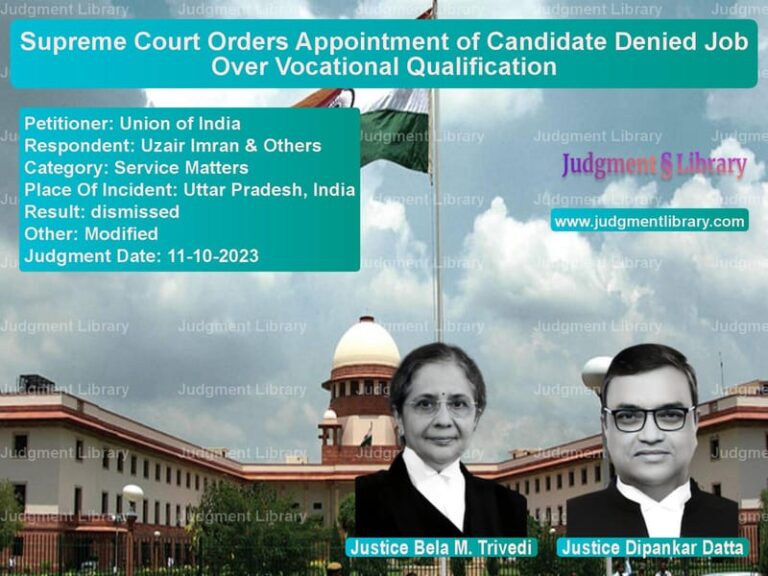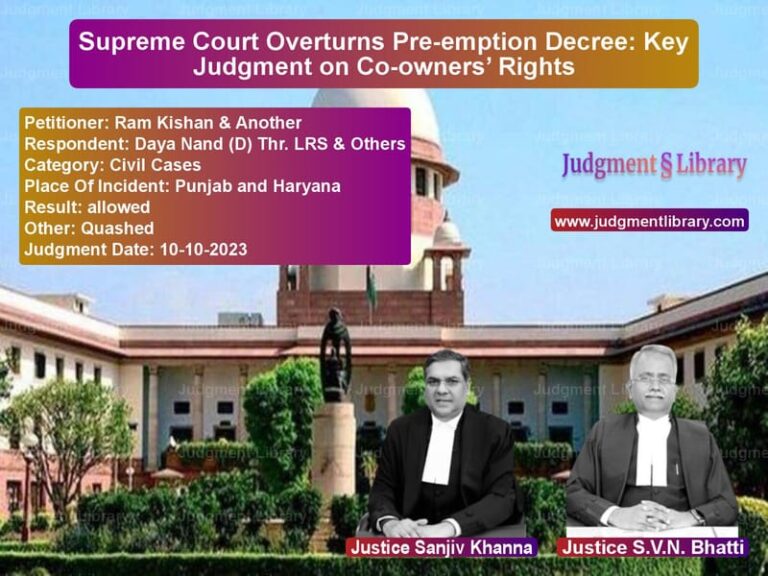Jaypee Infratech Case: Supreme Court’s Verdict on Homebuyers’ Rights and Insolvency Resolution
The Jaypee Infratech insolvency case has been a longstanding dispute, affecting thousands of homebuyers who invested in the housing projects of the company. The Supreme Court’s verdict in the case of Jaypee Kensington Boulevard Apartments Welfare Association v. NBCC (India) Ltd. was a significant milestone in ensuring justice for homebuyers and setting a precedent for real estate insolvency cases in India.
Background of the Case
Jaypee Infratech Ltd. (JIL), a subsidiary of Jaiprakash Associates Ltd. (JAL), was engaged in large-scale real estate and infrastructure projects, including the construction of the Yamuna Expressway. However, financial difficulties led JIL into insolvency under the Insolvency and Bankruptcy Code (IBC), 2016. The company defaulted on its debts, leaving numerous housing projects incomplete, resulting in legal disputes from homebuyers, financial creditors, and other stakeholders.
After multiple rounds of litigation and insolvency resolution attempts, the Committee of Creditors (CoC) approved a resolution plan submitted by NBCC (India) Ltd., a government-owned construction company. However, objections were raised regarding the implementation and viability of the plan, leading to further legal challenges.
Arguments by the Petitioners (Homebuyers’ Associations)
The homebuyers, represented by Jaypee Kensington Boulevard Apartments Welfare Association and other resident welfare associations, argued that:
- The resolution plan approved by the National Company Law Tribunal (NCLT) should be implemented without any further delays.
- NBCC should be held accountable for completing the pending construction of homes and delivering possession to homebuyers.
- Homebuyers, being financial creditors under the IBC, should have their financial interests prioritized in fund disbursement.
- The delay in implementing the resolution plan was causing undue hardship to homebuyers, many of whom had invested their life savings in these projects.
Arguments by the Respondents (NBCC and Other Stakeholders)
NBCC, the resolution applicant, and other stakeholders, including financial creditors, presented counterarguments:
- While NBCC’s resolution plan had been approved, certain modifications were necessary to ensure financial feasibility.
- Objections raised by financial creditors such as ICICI Bank and the Yamuna Expressway Industrial Development Authority (YEIDA) needed to be resolved.
- The NCLT had made modifications to the plan that went beyond its jurisdiction, requiring further legal clarifications.
- Ensuring project completion was a complex process that required regulatory and financial compliance.
Supreme Court’s Observations
The Supreme Court, while deliberating on the matter, made crucial observations regarding homebuyers’ rights, the insolvency resolution process, and the responsibilities of financial creditors and resolution applicants.
1. Protection of Homebuyers’ Rights
“The homebuyers form a significant part of the financial creditors under the IBC and their interests must be safeguarded while implementing a resolution plan.”
The Court acknowledged that homebuyers, who had invested in JIL projects, were entitled to legal protection and timely possession of their properties.
2. Corporate Insolvency Resolution Process (CIRP) Completion
“Insolvency proceedings must be completed within a reasonable timeframe to avoid prolonged delays that affect stakeholders, especially homebuyers who have been waiting for years.”
The Court directed that the resolution plan must be implemented in a time-bound manner to prevent further financial losses.
3. Financial Creditors’ Role
“While financial creditors play a crucial role in insolvency resolution, their objections should not stall the resolution process indefinitely.”
The Court emphasized that banks and other financial institutions should work towards a viable solution rather than creating unnecessary roadblocks.
Supreme Court’s Verdict
Based on the arguments and observations, the Supreme Court issued the following directives:
- The resolution process should be completed within an additional 45-day period from the date of the judgment.
- Only NBCC and Suraksha Realty were allowed to submit fresh or modified resolution plans, ensuring no further delays.
- NBCC must prioritize homebuyers’ interests and ensure timely construction and delivery.
- The matter was remanded to the Committee of Creditors for final approval and implementation.
Impact of the Judgment
The Supreme Court’s ruling had a significant impact on the real estate sector and insolvency proceedings in India:
- It reinforced the importance of homebuyers as financial creditors under the IBC.
- It ensured that insolvency resolutions must be implemented within a fixed timeline to prevent further losses.
- It set a precedent for other real estate insolvency cases, ensuring that companies cannot indefinitely delay project completion.
The judgment was a relief for thousands of homebuyers who had been waiting for their homes for years. It provided clarity on the role of resolution applicants, financial creditors, and the responsibilities of the government in resolving real estate insolvencies.
Conclusion
The Jaypee Infratech case is a landmark ruling in India’s real estate and insolvency sector. By ensuring that homebuyers’ rights are protected and mandating a strict timeline for resolution, the Supreme Court reinforced the principles of fairness and efficiency in insolvency proceedings. The judgment serves as a guiding framework for future cases, ensuring that delays in real estate projects do not leave investors and homebuyers stranded.
Petitioner Name: Jaypee Kensington Boulevard Apartments Welfare Association.Respondent Name: NBCC (India) Ltd..Judgment By: Justice A.M. Khanwilkar, Justice Dinesh Maheshwari.Place Of Incident: Noida.Judgment Date: 24-03-2021.
Don’t miss out on the full details! Download the complete judgment in PDF format below and gain valuable insights instantly!
Download Judgment: jaypee-kensington-bo-vs-nbcc-(india)-ltd.-supreme-court-of-india-judgment-dated-24-03-2021.pdf
Directly Download Judgment: Directly download this Judgment
See all petitions in Company Law
See all petitions in Bankruptcy and Insolvency
See all petitions in Corporate Compliance
See all petitions in Judgment by A M Khanwilkar
See all petitions in Judgment by Dinesh Maheshwari
See all petitions in partially allowed
See all petitions in Remanded
See all petitions in supreme court of India judgments March 2021
See all petitions in 2021 judgments
See all posts in Corporate and Commercial Cases Category
See all allowed petitions in Corporate and Commercial Cases Category
See all Dismissed petitions in Corporate and Commercial Cases Category
See all partially allowed petitions in Corporate and Commercial Cases Category







